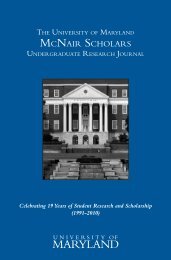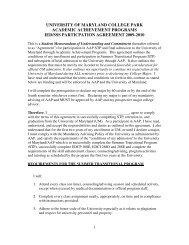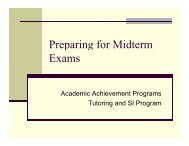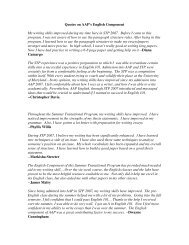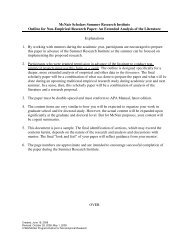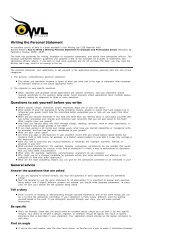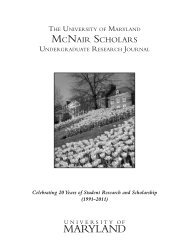mcnair scholars - Academic Achievement Programs - University of ...
mcnair scholars - Academic Achievement Programs - University of ...
mcnair scholars - Academic Achievement Programs - University of ...
Create successful ePaper yourself
Turn your PDF publications into a flip-book with our unique Google optimized e-Paper software.
12 <strong>University</strong> <strong>of</strong> Maryland • Inaugural Edition<br />
<strong>University</strong> <strong>of</strong> Maryland • Inaugural Edition 13<br />
The Central American Free Trade Agreement:<br />
From Ratification to Implementation<br />
with an Emphasis on Poverty in the Rural<br />
Areas <strong>of</strong> El Salvador<br />
Isabela del Carmen Azucena<br />
Mentor: Dr. Wallace Southerland III<br />
<strong>University</strong> <strong>of</strong> Maryland, College Park<br />
Abstract<br />
The Central American Free Trade Agreement (CAFTA) is one that particularly<br />
sparks and merits attention. Essentially, CAFTA is an accord between five Central<br />
American countries, the Dominican Republic and the United States. In the eyes <strong>of</strong><br />
its authors, CAFTA will foster democratic development, economic reform, and free<br />
trade; but the implementations <strong>of</strong> CAFTA also brings into question the dominant<br />
role and powerful influence <strong>of</strong> the United States in Central American policy, hence<br />
the salience <strong>of</strong> this study. This qualitative cases study focuses implementation aspect<br />
<strong>of</strong> CAFTA within El Salvador. More specifically, the study examines how, if at all,<br />
implementation has affected poverty within the rural areas <strong>of</strong> El Salvador.<br />
This study is guided by two main research questions: What are the characteristics<br />
<strong>of</strong> poverty in the rural areas <strong>of</strong> El Salvador? and Who are they major players in the<br />
implementation <strong>of</strong> CAFTA in El Salvador? Answers to these two research questions<br />
enable the analyst to answer a final, broader, more salient research question: How<br />
has the implementation <strong>of</strong> CAFTA changed, if at all, the characteristics <strong>of</strong> poverty<br />
in rural areas <strong>of</strong> El Salvador and who were responsible for those changes?<br />
To answer the research questions, written records on CAFTA in general and<br />
CAFTA’s implementation, electronic data, documentary data, and interview data<br />
will be collected and analyzed. To aid the analyst in data collection and analysis, an<br />
analytic framework steeped in political orientations <strong>of</strong> policy making and economic<br />
theories <strong>of</strong> poverty will serve as a conceptual map for the study. To construct the<br />
analytic framework for this study, literature on poverty, policymaking, public policy<br />
at the federal level, and CAFTA will be examined. As a result <strong>of</strong> reviewing the<br />
aforementioned bodies <strong>of</strong> literature, analytical categories will be extrapolated,<br />
integrated into research questions, added to interview instrument, and will be used<br />
to collect, sort, categorize, and analyze the qualitative data. This study will include a<br />
set <strong>of</strong> conclusions and recommendations for future research.<br />
In sum, this study is important because little is known regarding the<br />
implementation <strong>of</strong> CAFTA and what players influenced, managed, or controlled<br />
implementation strategies. Further, this study is important because gaps exist in the<br />
literature regarding CAFTA’s influence on poverty in the rural areas <strong>of</strong> El Salvador.<br />
The results from this study will add to current scholarly thought on CAFTA<br />
implementation.



